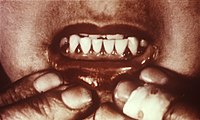
Photo from wikipedia
Anthracnose, caused by Colletotrichum gloeosporioides, is one of the most important diseases in papaya fruit. Its control has been achieved with synthetic fungicides, but the application of marine bacteria and… Click to show full abstract
Anthracnose, caused by Colletotrichum gloeosporioides, is one of the most important diseases in papaya fruit. Its control has been achieved with synthetic fungicides, but the application of marine bacteria and the sulphated polysaccharide ulvan (structural description: β[1,4]-D-GlcA-α[1,4]-L-Rha 3 sulfate, β[1,4]-L-IdoA-α[1,4]-L-Rha 3 sulfate, β[1,4]-D-Xyl-α[1,4]-L-Rha 3 sulfate, and β[1,4]-D-Xyl 2-sulfate-α[1,4]-L-Rha 3 sulfate) from Ulva sp. can be an alternative in the use of agrochemicals. Thus, the objective of this study was to assess the effect in vitro and in vivo of two marine bacteria, Stenotrophomonas rhizophila and Bacillus amyloliquefaciens, and ulvan in papaya fruit’s bio-protection against C. gloeosporioides. The capacity of marine bacteria to inhibit mycelial growth and phytopathogen spore germination in vitro through volatile organic compounds (VOCs) and carbohydrate competition was evaluated. Fruit was inoculated with bacteria, ulvan, and C. gloeosporioides and incubated at 25 °C and 90% of relative humidity (RH) for seven days. Disease incidence (%), lesion diameter (mm), and antioxidant defense enzyme activity (such as superoxide dismutase (SOD), catalase (CAT), and peroxidase (POD) were quantified. In vitro, C. gloeosporioides was inhibited by S. rhizophila and B. amyloliquefaciens. In vivo, disease incidence and the lesion diameter of anthracnose on papaya fruit were significantly reduced by marine bacteria and ulvan. Antioxidant defense enzyme activity played an important role in fruit bio-protection against C. gloeosporioides. The application of marine bacteria and ulvan can be an alternative in the sustainable postharvest management of papaya.
Journal Title: Antioxidants
Year Published: 2019
Link to full text (if available)
Share on Social Media: Sign Up to like & get
recommendations!